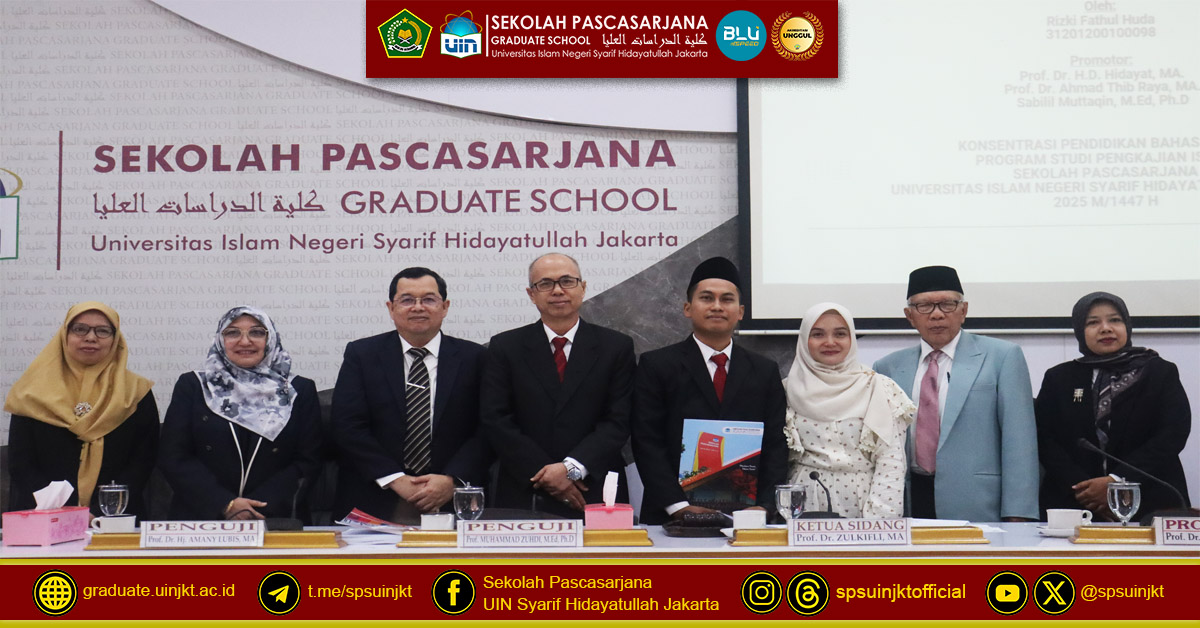Rizki Fathul Huda's Doctoral Promotion Exam, Performative Arabic Proficiency: An Examination of the Contribution of Linguistic Value and CEFR Pedagogical Model
Auditorium Prof. Dr. Suwito, MA SPs UIN Jakarta, SPs NEWS - The Graduate School of Syarif Hidayatullah State Islamic University (SPs UIN) Jakarta held the 164th Doctoral Promotion Exam at the Auditorium Prof. Dr. Suwito, MA SPs UIN Jakarta on Monday, 15 September 2025 with promovendus Rizki Fathul huda.
Rizki is a student of the Islamic Studies Doctoral programme with a concentration in Arabic Language Education. Rizki wrote a dissertation entitled "Performative Arabic Language Proficiency: An Examination of the Contribution of Linguistic Value and Pedagogical Model of the Common European Framework of Reference for Languages (CEFR) ". This research offers an innovative solution to reform Arabic language learning in higher education.
This dissertation highlights the need for improvement in the Arabic language learning system in Indonesia. So far, learning tends to focus more on normative grammatical aspects, which is often less effective in training students to use Arabic functionally and communicatively. Rizki sees that the adaptation of the CEFR, an international reference framework that has been successful in the learning of European languages, could be the key to addressing this problem.
Rizki explains that his research focuses on three main objectives. Firstly, identifying the linguistic values of the CEFR that are compatible with the Arabic language system. Second, analysing a pedagogical model based on action-oriented approach (AoA) supported by the ecological theory of language learning. Third, formulating the contribution of both to formulate more contextualised and effective learning outcomes.
Qualitative approach with synthesis-comparative and evaluative techniques is the main method in this research. Rizki used ecological theory as a "lens" to analyse how language learning interacts with its academic environment. Literature data was analysed in depth, including studying the phonology, morphology and syntax of Arabic, then integrating it with the concepts of naḥwtaʿlīmī (teaching grammar) and naḥwwaẓīfī (functional grammar).
The pedagogical model of AoA, which emphasises the use of language to solve real tasks, is examined through the five main principles of ecological theory: agency, contextuality, emergence, affordance, and mediation. The results of this analysis show that learning becomes more participatory and responsive to students' needs. This allows students to not only memorise rules, but also use them in real situations.
Rizki found that the CEFR's linguistic values-which are performative, communicative, and contextual-are highly compatible with the Arabic linguistic system. This shows that the CEFR framework is not only suitable for European languages, but can also be effectively applied to Semitic languages such as Arabic.
In addition, Rizki's formulation of the Performative Level Description (DLP) is one of the most significant practical contributions of his dissertation. This DLP integrates communicative functions with linguistic resources at B1 level for four language proficiencies: listening(istimāʿ), reading(qirāʾah), speaking(kalām), and writing(kitābah). These DLPs then become the basis for formulating more structured course learning outcomes (CPMK) and sub-CPMK.
The formulation of DLP-based CPMK and sub-CPMK shows strong consistency, both vertically (inter-sublevel) and horizontally (across skills). This consistency is very important to ensure the quality of learning, facilitate the design of teaching materials, and design more accurate performance-based assessments. Thus, the process of evaluating and improving the quality of learning can be done more systematically.
Rizki's research not only corroborates the findings of previous researchers, such as Rasha Soliman (2017) and Tulus Musthofa (2022), but also extends them. He managed to fully integrate the linguistic values and pedagogical model of the CEFR within an ecological framework, making it a comprehensive model that is relevant to the context of higher education in Indonesia.
Theoretically, this dissertation contributes greatly to the strengthening of CEFR adaptation studies outside the context of European languages. Practically, the results of this research provide guidance in the form of DLP formulations and learning outcomes that are ready to be implemented. Hopefully, this innovation can be the basis for developing a more modern and effective curriculum, giving birth to a generation of students who not only master grammar, but are also adept at communicating in Arabic.
Rizki Fathul Huda successfully defended his dissertation under the guidance of Prof. Dr. H.D. Hidayat, MA, Prof. Dr. Ahmad Thib Raya, MA and Sabilil Muttaqin, M.Ed, Ph.D, and was tested before a board of examiners consisting of Prof. Dr. Zulkifli, MA, Prof. Dr. H.D. Hidayat, MA, Prof. Dr. Hj. Amany Lubis, MA, Prof. Muhammad Zuhdi, M.Ed, Ph.D and Dr. Maswani, MA.
After paying attention to the dissertation writing, the examiners' comments and the promovendus' answers, the examiners determined that Rizki Fathul Huda graduated with a Very Satisfactory predicate. Rizki Fathul Huda is the 164th Doctor in the field of Islamic Studies, at the doctoral programme of the Graduate School of UIN Syarif Hidayatullah Jakarta.(JA)

